2010年中考英语常用270个动词用法详解
- 格式:doc
- 大小:155.50 KB
- 文档页数:23
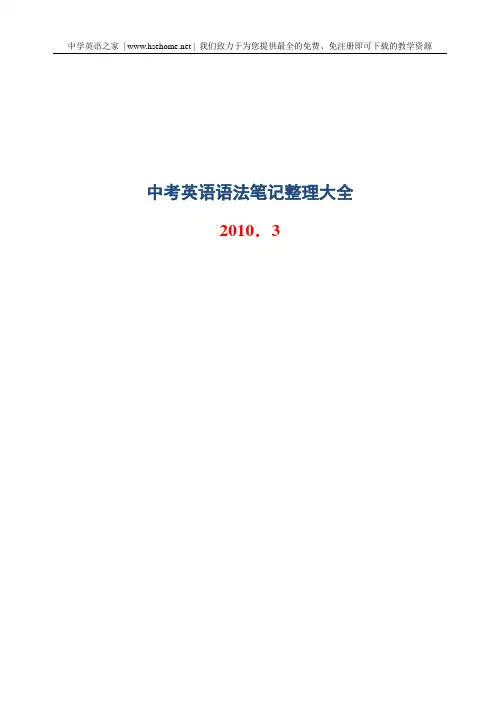
中考英语语法笔记整理大全2010.3名词表示人、事物、地方、现象或抽象概念等的名称的词。
知识梳理:提纲挈领,抓住重点和难点!一、名词的分类注:1.专有名词是指人、地方、团体、机构等特有的名称。
第一个字母必须大写。
专有名词前一般不加冠词。
2、有普通名词构成的专有名词前要用定冠词―the‖,但它不大写。
3、有些不可数名词有时表示为具体的东西时,则变为可数名词,而且以四上也有了变化。
eg. beer ----a beer 一杯啤酒,work--- a work 工厂,著作,glass---a glass 一个玻璃杯,room空间---a room一个房间二、名词的数:表示可以计算数目的人或物称为可数名词。
1、可数名词有单、复数两种形式:可数名词的单数形式要在名词前加―a或an‖;复数形式是在名词后加―-s或-es‖。
名词复数形式有规则变化和不规则变化两种,规则2. 可数名词复数的不规则变化①改变单数名词中的元音字母eg. man--men, woman—women, tooth—teeth, foot—feet, goose—geese, mouse--mice②单复数同形eg. Chinese-Chinese, deer-deer, fish-fish, sheep-sheep,…③由man 和woman构成的合成词, 每个名词都要变复数eg. a man doctor— men doctors, a woman teacher--women teachers 注意: 有些名词表示一种物体具有不可分割的相同的两部分,在使用时只有复数形式eg. trousers, clothes, glasses, shorts,scissors, etc;有些名词从形式上看是复数,实际上是单数(其后的谓语动词要用单数). eg. maths, phyiscs, politics, news3. 不可数名词:表示不能计算数目的人或物,称为不可数名词。
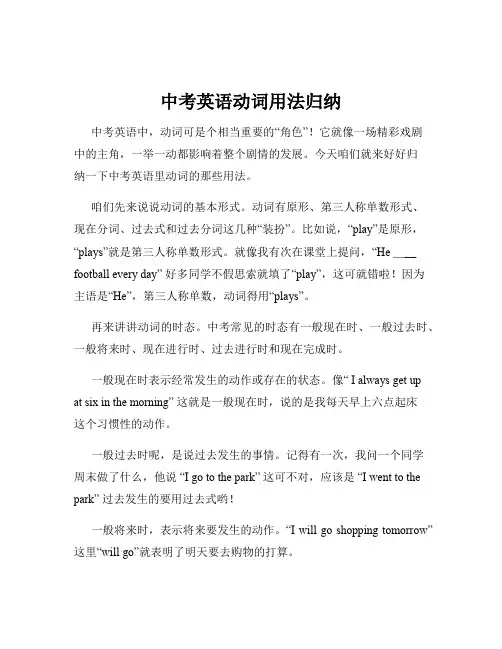
中考英语动词用法归纳中考英语中,动词可是个相当重要的“角色”!它就像一场精彩戏剧中的主角,一举一动都影响着整个剧情的发展。
今天咱们就来好好归纳一下中考英语里动词的那些用法。
咱们先来说说动词的基本形式。
动词有原形、第三人称单数形式、现在分词、过去式和过去分词这几种“装扮”。
比如说,“play”是原形,“plays”就是第三人称单数形式。
就像我有次在课堂上提问,“He ___ football every day” 好多同学不假思索就填了“play”,这可就错啦!因为主语是“He”,第三人称单数,动词得用“plays”。
再来讲讲动词的时态。
中考常见的时态有一般现在时、一般过去时、一般将来时、现在进行时、过去进行时和现在完成时。
一般现在时表示经常发生的动作或存在的状态。
像“ I always get upat six in the morning” 这就是一般现在时,说的是我每天早上六点起床这个习惯性的动作。
一般过去时呢,是说过去发生的事情。
记得有一次,我问一个同学周末做了什么,他说“I go to the park” 这可不对,应该是“I went to the park” 过去发生的要用过去式哟!一般将来时,表示将来要发生的动作。
“I will go shopping tomorrow” 这里“will go”就表明了明天要去购物的打算。
现在进行时,强调正在进行的动作。
“Look! They are playing basketball” 这个“are playing”就形象地展现出他们正在打篮球的场景。
过去进行时,是过去某个时刻正在发生的动作。
比如“I was readinga book when she came in” 我正看书呢,她进来了。
现在完成时,是过去发生的动作对现在造成的影响或结果。
“I have finished my homework” 我已经完成作业啦,这对现在的情况有了交代。
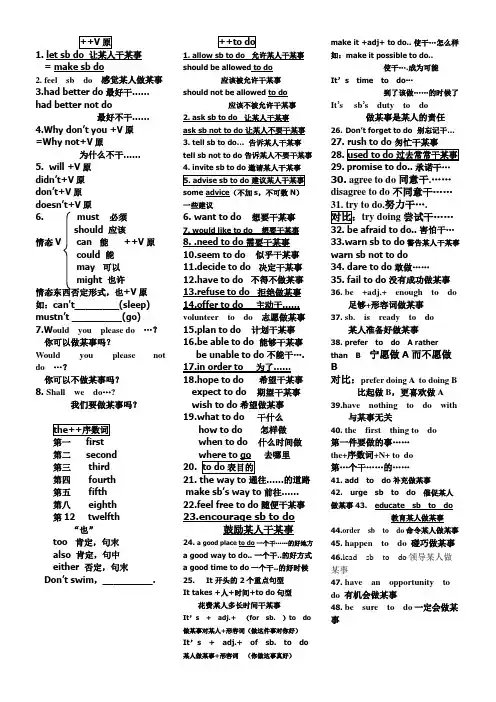
1. let sb do 让某人干某事= make sb do2. feel sb do 感觉某人做某事3.had better do 最好干……had better not do最好不干……4.Why don’t you +V原=Why not+V原为什么不干……5. will +V原didn’t+V原don’t+V原doesn’t+V原6. must 必须should 应该情态V can 能 ++V原could 能may 可以might 也许情态东西否定形式,也+V原如:can't________(sleep) mustn’t _________(go)7.W ould you please do…?你可以做某事吗?Would you please not do…?你可以不做某事吗?8. Shall we do…?我们要做某事吗?第一 first第二 second第三 third第四 fourth第五 fifth第八 eighth第12 twelfth“也”too 肯定,句末also 肯定,句中either 否定,句末Don’t swim,_________. 1. allow sb to do 允许某人干某事should be allowed to do应该被允许干某事should not be allowed to do应该不被允许干某事2. ask sb to do 让某人干某事ask sb not to do 让某人不要干某事3. tell sb to do… 告诉某人干某事tell sb not to do 告诉某人不要干某事4. invite sb to do 邀请某人干某事some advice(不加s,不可数N)一些建议6. want to do 想要干某事7. would like to do 想要干某事8. .need to do 需要干某事10.seem to do 似乎干某事11.decide to do 决定干某事12.have to do 不得不做某事13.refuse to do 拒绝做某事14.offer to do 主动干……volunteer to do 志愿做某事15.plan to do 计划干某事16.be able to do 能够干某事be unable to do 不能干….17.in order to 为了……expect to do 期望干某事wish to do 希望做某事19.what to do 干什么how to do 怎样做when to do 什么时间做去哪里……的道路make sb’s way to 前往……22.feel free to do 随便干某事23.encourage sb to do鼓励某人干某事24. a good place to do 一个干……的好地方a good way to do.. 一个干..的好方式a good time to do一个干..的好时候25. It 开头的 2个重点句型It takes +人+时间+to do句型花费某人多长时间干某事It’s+adj.+(for sb.)to do做某事对某人+形容词(做这件事对你好)It’s+adj.+of sb.to do某人做某事+形容词(你做这事真好)make it +adj+ to do.. 使干…怎么样如:make it possible to do..使干….成为可能It’s time to do…到了该做……的时候了It’s sb’s duty to do做某事是某人的责任26.Don’t forget to do 别忘记干…29.30.agree to do 同意干.……disagree to do 不同意干……努力干….try doing 尝试干……害怕干…33.warn sb to do警告某人干某事warn sb not to do34. dare to do 敢做……35. fail to do 没有成功做某事36. be+adj.+enough to do足够+形容词做某事37. sb.is ready to do某人准备好做某事38. prefer to do A ratherthan B 宁愿做A而不愿做B对比:prefer doing A to doing B比起做B,更喜欢做A39.have nothing to do with与某事无关40. the first thing to do第一件要做的事……the+序数词+N+ to do第…个干……的……41. add to do 补充做某事42.urge sb to do催促某人做某事cate sb to do教育某人做某事44.order sb to do命令某人做某事45. happen to do 碰巧做某事46.lead sb to do领导某人做某事47. have an opportunity todo 有机会做某事48. be sure to do一定会做某事1. be always doing 总是干某事2. be busy doing 忙于干某事 对比 :be busy with sth 忙于某事 3. enjoy doing 喜欢干某事 4. like doing 喜欢干某事 love doing 喜爱干某事 5. feel like doing 想要做…… 6. 对比 would like to do 7. keep doing 一直干某事 (kept 过-kept )keep sb doing 使某人一直做某事8. keep on doing 坚持干某事waste time doing 浪费时间干某事 9.stop/keep/prevent …from doing 阻止某人做某事9. finish doing 完成干某事 10. mind doing 介意干某事don ’t mind+doing 不介意干… can’t stand doing 不能忍受干… can't help doing 情不自禁干……11.… 12.(spend--spent 过-spent )花……干某事.对比:spend …on +N in 可以省略,on 不可以省略 13. have problems (in )+doing ==have difficulties (in )+doing干……有问题havetrouble doing 做某事有困难 12.succeed in doing 成功干某事of ;up 往下;沿着 before 反对;靠着如:be interested in doing 对……感兴趣be good at doing 擅长于干…How about doing ==What about doing干……怎么样?thanks for doing 因…而感谢 Thanks for helping me.谢谢你帮我.=Thanks for your help me.14. to 竟然为介词时,4个不正常的词组如下:期望干某事pay attention to doing 注意干… stick to doing 坚持干某事习惯于干某事used to do 过去常常干某事 15. be willing to do 乐意干某事 16.take up doing 从事干某事 end up doing 以做某事结束 give up doing 放弃做某事 17. avoid doing 避免干某事 18.consider doing 考虑干某事19.be afraid of doing 害怕做某事20. do some cooking/cleaning/ reading/shopping/washing做点饭/打扫一下卫生/读点书/逛逛街/洗洗衣服21. go swimming/fishing/ shopping/skating/boating去游泳/钓鱼/ 逛街/滑冰/划船 22. have fun doing 很开心做某事23. waste time/money doing浪费时间或金钱做某事24. instead of doing 代替做某事对比: instead+句子 25. miss doing 错过做某事 26. hold on to doing 坚持做某事27. suggest doing 建议做某事 28. put off doing 推迟做某事 29. succeed in doing 成功做某事30. prefer doing A to doing BB ,更喜欢做Aprefer to do A ratherthan B 宁愿做A 而不愿做B1.be+adj; stay+adj; keep+adj; feel+adj 。
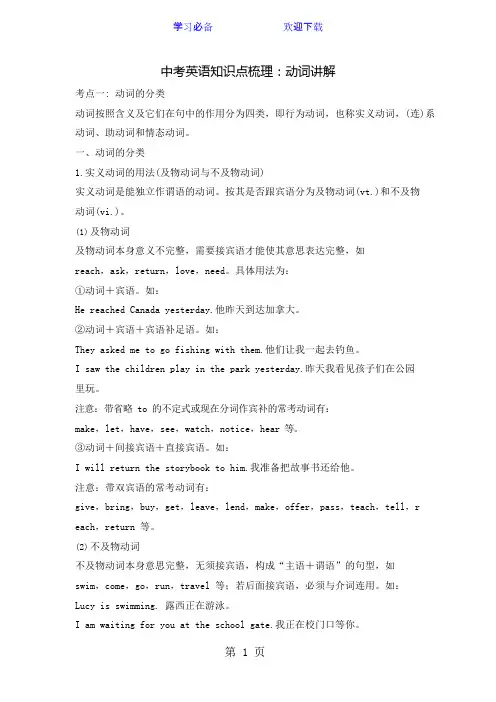
中考英语知识点梳理:动词讲解考点一: 动词的分类动词按照含义及它们在句中的作用分为四类,即行为动词,也称实义动词,(连)系动词、助动词和情态动词。
一、动词的分类1.实义动词的用法(及物动词与不及物动词)实义动词是能独立作谓语的动词。
按其是否跟宾语分为及物动词(vt.)和不及物动词(vi.)。
(1)及物动词及物动词本身意义不完整,需要接宾语才能使其意思表达完整,如reach,ask,return,love,need。
具体用法为:①动词+宾语。
如:He reached Canada yesterday.他昨天到达加拿大。
②动词+宾语+宾语补足语。
如:They asked me to go fishing with them.他们让我一起去钓鱼。
I saw the children play in the park yesterday.昨天我看见孩子们在公园里玩。
注意:带省略 to 的不定式或现在分词作宾补的常考动词有:make,let,have,see,watch,notice,hear 等。
③动词+间接宾语+直接宾语。
如:I will return the storybook to him.我准备把故事书还给他。
注意:带双宾语的常考动词有:give,bring,buy,get,leave,lend,make,offer,pass,teach,tell,r each,return 等。
(2)不及物动词不及物动词本身意思完整,无须接宾语,构成“主语+谓语”的句型,如swim,come,go,run,travel 等;若后面接宾语,必须与介词连用。
如:Lucy is swimming. 露西正在游泳。
I am waiting for you at the school gate.我正在校门口等你。
(3)有些动词既可作及物动词,又可作不及物动词。
如:We study English.我们学习英语。
(及物)We study hard.我们学习努力。
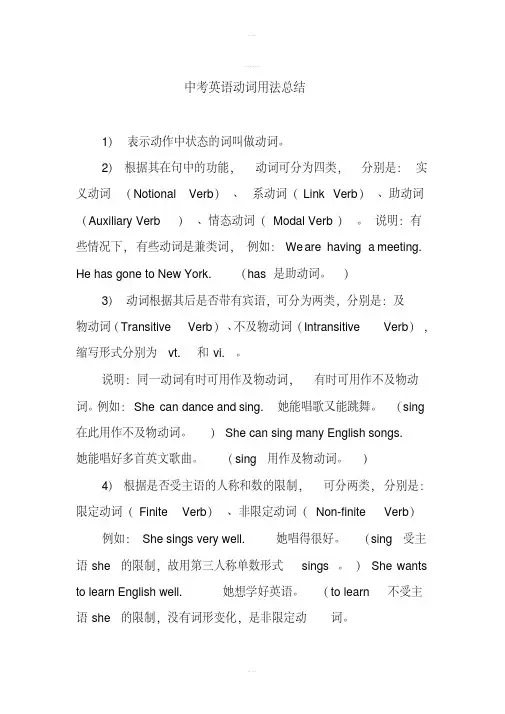
中考英语动词用法总结【知识点总结归纳】中考英语动词用法总结1)表示动作中状态的词叫做动词。
2)根据其在句中的功能,动词可分为四类,分别是:实义动词(Notional Verb)、系动词(Link Verb)、助动词(Auxiliary Verb)、情态动词(Modal Verb)。
说明:有些情况下,有些动词是兼类词,例如: We are having a meeting. He has gone to New York. (has 是助动词。
)*..**..**..**..**..*3)动词根据其后是否带有宾语,可分为两类,分别是:及物动词(Transitive Verb)、不及物动词(Intransitive Verb),缩写形式分别为 vt. 和 vi.。
--*--*--*--*--说明:同一动词有时可用作及物动词,有时可用作不及物动词。
例如: She can dance and sing. 她能唱歌又能跳舞。
(sing 在此用作不及物动词。
) She can sing many English songs.她能唱好多首英文歌曲。
(sing 用作及物动词。
)*..**..**..**..**..4)根据是否受主语的人称和数的限制,可分两类,分别是:限定动词(Finite Verb)、非限定动词(Non-finite Verb)--*--*--*--*--*例如: She sings very well. 她唱得很好。
(sing 受主语 she 的限制,故用第三人称单数形式 sings。
) She wants to learn English well. 她想学好英语。
(to learn 不受主语 she 的限制,没有词形变化,是非限定动词。
--*--*--*--*--说明:英语中共有三种非限定动词,分别是:动词不定式(Infinitive)、动名词(Gerund)、分词(Participle)。
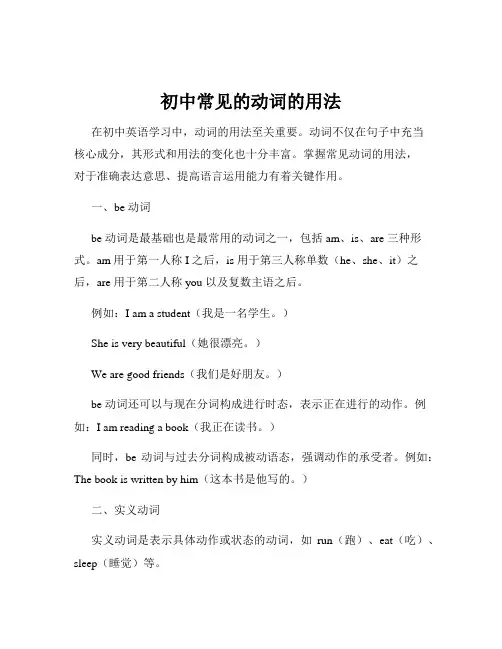
初中常见的动词的用法在初中英语学习中,动词的用法至关重要。
动词不仅在句子中充当核心成分,其形式和用法的变化也十分丰富。
掌握常见动词的用法,对于准确表达意思、提高语言运用能力有着关键作用。
一、be 动词be 动词是最基础也是最常用的动词之一,包括 am、is、are 三种形式。
am 用于第一人称 I 之后,is 用于第三人称单数(he、she、it)之后,are 用于第二人称 you 以及复数主语之后。
例如:I am a student(我是一名学生。
)She is very beautiful(她很漂亮。
)We are good friends(我们是好朋友。
)be 动词还可以与现在分词构成进行时态,表示正在进行的动作。
例如:I am reading a book(我正在读书。
)同时,be 动词与过去分词构成被动语态,强调动作的承受者。
例如:The book is written by him(这本书是他写的。
)二、实义动词实义动词是表示具体动作或状态的动词,如run(跑)、eat(吃)、sleep(睡觉)等。
1、及物动词与不及物动词及物动词后面必须接宾语,才能完整表达意思。
例如:I eat an apple(我吃一个苹果。
)“eat”是及物动词,“apple”是宾语。
不及物动词后面不需要接宾语就能表达完整的意思。
例如:Heruns fast(他跑得很快。
)“run”是不及物动词。
2、动词的时态一般现在时:表示经常发生的动作或存在的状态。
主语是第三人称单数时,动词要加“s”或“es”。
例如:He studies hard(他学习努力。
)一般过去时:表示过去发生的动作或存在的状态。
动词通常变为过去式,规则动词加“ed”,不规则动词有特殊的变化形式。
例如:I played basketball yesterday(我昨天打篮球了。
)现在进行时:表示正在进行的动作,由“be 动词+现在分词”构成。
例如:They are playing football now(他们现在正在踢足球。
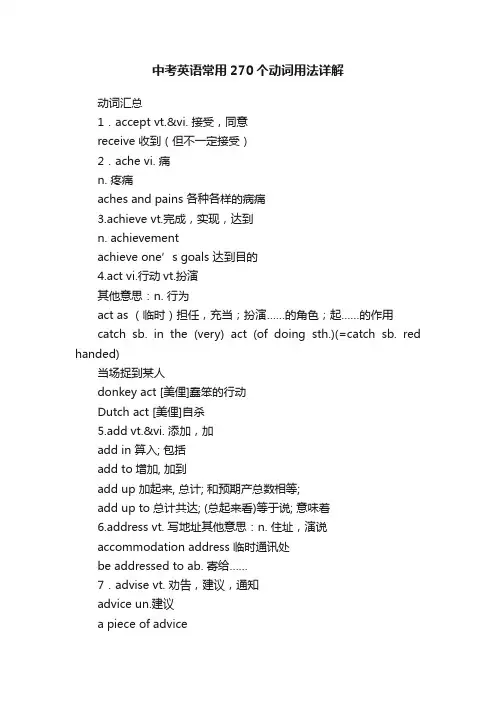
中考英语常用270个动词用法详解动词汇总1.accept vt.&vi. 接受,同意receive 收到(但不一定接受)2.ache vi. 痛n. 疼痛aches and pains 各种各样的病痛3.achieve vt.完成,实现,达到n. achievementachieve one’s goals 达到目的4.act vi.行动vt.扮演其他意思:n. 行为act as (临时)担任,充当;扮演……的角色;起……的作用catch sb. in the (very) act (of doing sth.)(=catch sb. red handed)当场捉到某人donkey act [美俚]蠢笨的行动Dutch act [美俚]自杀5.add vt.&vi. 添加,加add in 算入; 包括add to增加, 加到add up 加起来, 总计; 和预期产总数相等;add up to总计共达; (总起来看)等于说; 意味着6.address vt. 写地址其他意思:n. 住址,演说accommodation address 临时通讯处be addressed to ab. 寄给……7.advise vt. 劝告,建议,通知advice un.建议a piece of adviceadvise sb. to do sth . 建议……做……8.afford vt. 负担得起,买得起,提供afford time/money (动词前往往有情态动词can或can’t)9. agree vt.&vi. 同意,赞成agree like cats and dogs 水火不相容agree to do 同意做……。
agree with同意...的意见; 与...一致; 对...适合10.aim vi. 瞄准,针对其他意思:n. 目标,目的11.allow vt. 准许allowance 津贴allow doing 允许做……allow sb. to do 允许某人做……be allowed to do 被允许做……12.answer vt. 回答,答复其他意思:n. 答案,回答soft answer 温和[委婉]的回答answer the door /telephonethe answer to the questionanswer the question = reply to the question13.arrive vi. 到达n arrivalarrive at/in 到达(目的地); 达到, 得出(结论等)(没有明确地点arrive)=get to = reach (够到……,达到某种水平或数字)14.ask vt. 询问,请求,要求ask sb. for sth 要; 请求, 征求要(价) 找ask sb. (not) to do sth.15.avoid vt.避免,撤销avoid doing 避免做某事16.awake vt.唤醒vi.醒其他意思:adj. 醒着的be wide/broad awake 完全醒着警觉; 不易上当受骟完全知道, 充分觉察到awake to the fact that 认识到...的事实be/keep awake 醒着17.wake v. 醒wake up 醒来e.g. James usually wakes up early.wake sb up 叫醒……e.g. My mother wakes me up at six o’clock.辨析:①wake多用于不及物动词②waken只用于及物动词③awake指唤醒(意志……)也可为adj指清醒的18.be (is am are was were being been)v. 是存在aux.v (无词义) Let it be. 随它去be+及物动词过去分词构成被动语态be+现在分词构成进行时be+有to的不定式表示约定计划职责义务愿望可能命运等The book is to come out.You are not to do that. 你不该那样做.be for 到…去赞成I’m for Shanghai.We are for just war.be from 从…来生在(某处)be gone. 走开,不见了。
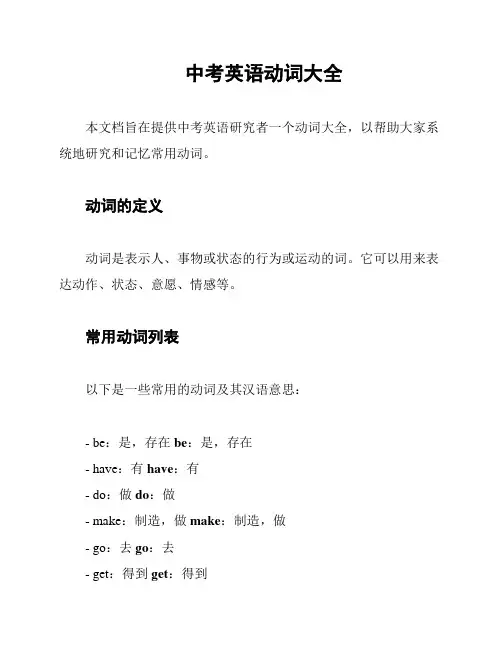
中考英语动词大全本文档旨在提供中考英语研究者一个动词大全,以帮助大家系统地研究和记忆常用动词。
动词的定义动词是表示人、事物或状态的行为或运动的词。
它可以用来表达动作、状态、意愿、情感等。
常用动词列表以下是一些常用的动词及其汉语意思:- be:是,存在be:是,存在- have:有have:有- do:做do:做- make:制造,做make:制造,做- go:去go:去- get:得到get:得到- say:说say:说- see:看见see:看见- take:拿,取take:拿,取- can:能够can:能够- will:将要will:将要- give:给予give:给予- find:找到find:找到- think:思考think:思考- know:知道know:知道- want:想要want:想要- need:需要need:需要- like:喜欢like:喜欢- love:爱love:爱- believe:相信believe:相信- say:说say:说- feel:感觉feel:感觉- work:工作work:工作- call:打电话call:打电话- try:尝试try:尝试- ask:问ask:问- use:使用use:使用- tell:告诉tell:告诉以上只是一部分常用动词的例子,你可以根据具体语境和需要进一步研究和掌握更多动词。
总结动词在英语研究中起着重要的作用,它们帮助我们表达动作、状态和情感。
通过系统地研究和练动词,我们能够提高自己的英语表达能力。
希望本文档对你的中考英语研究有所帮助!注意:本文档提供的动词仅供参考,可以根据自己的需要和研究进度进行扩展和调整。
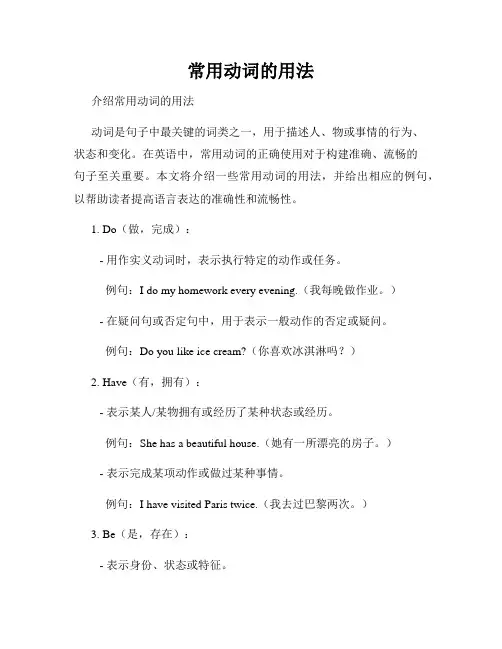
常用动词的用法介绍常用动词的用法动词是句子中最关键的词类之一,用于描述人、物或事情的行为、状态和变化。
在英语中,常用动词的正确使用对于构建准确、流畅的句子至关重要。
本文将介绍一些常用动词的用法,并给出相应的例句,以帮助读者提高语言表达的准确性和流畅性。
1. Do(做,完成):- 用作实义动词时,表示执行特定的动作或任务。
例句:I do my homework every evening.(我每晚做作业。
) - 在疑问句或否定句中,用于表示一般动作的否定或疑问。
例句:Do you like ice cream?(你喜欢冰淇淋吗?)2. Have(有,拥有):- 表示某人/某物拥有或经历了某种状态或经历。
例句:She has a beautiful house.(她有一所漂亮的房子。
) - 表示完成某项动作或做过某种事情。
例句:I have visited Paris twice.(我去过巴黎两次。
)3. Be(是,存在):- 表示身份、状态或特征。
例句:I am a student.(我是一名学生。
)- 表示存在或位置。
例句:The book is on the table.(书在桌子上。
)4. Go(去,进行):- 表示移动到某个地方。
例句:I want to go to the park.(我想去公园。
)- 表示进行某种活动。
例句:She goes swimming every weekend.(她每个周末去游泳。
)5. Make(制作,做):- 表示创造、制造或完成某件事情。
例句:She makes delicious cakes.(她做出美味的蛋糕。
) - 表示强迫或引起某种情感或感觉。
例句:The movie makes me feel sad.(这部电影让我感到悲伤。
)6. Take(拿,带):- 表示获取、接受或拿走某物。
例句:Can you take this package for me?(你能帮我拿这个包裹吗?)- 表示进行某种行动或采取某种方式。
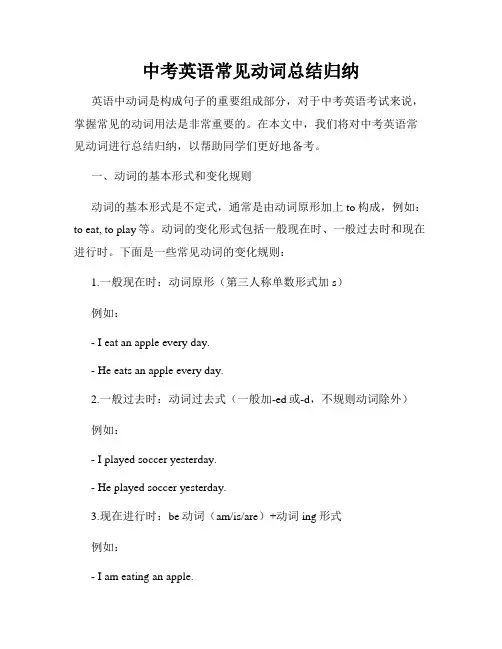
中考英语常见动词总结归纳英语中动词是构成句子的重要组成部分,对于中考英语考试来说,掌握常见的动词用法是非常重要的。
在本文中,我们将对中考英语常见动词进行总结归纳,以帮助同学们更好地备考。
一、动词的基本形式和变化规则动词的基本形式是不定式,通常是由动词原形加上to构成,例如:to eat, to play等。
动词的变化形式包括一般现在时、一般过去时和现在进行时。
下面是一些常见动词的变化规则:1.一般现在时:动词原形(第三人称单数形式加s)例如:- I eat an apple every day.- He eats an apple every day.2.一般过去时:动词过去式(一般加-ed或-d,不规则动词除外)例如:- I played soccer yesterday.- He played soccer yesterday.3.现在进行时:be动词(am/is/are)+动词ing形式例如:- I am eating an apple.- He is eating an apple.二、常见动词的用法总结1. 喜欢:likelike是一个常见的动词,用于表示喜欢或者喜爱。
它可以用于一般现在时和一般过去时。
例如:- I like playing basketball.- She liked the movie.2. 看:seesee是一个常见的动词,用于表示看见或者观看。
它可以用于一般现在时、一般过去时和现在进行时。
例如:- I see a bird in the sky.- She saw a movie last night.- They are seeing a doctor now.3. 学习:studystudy是一个常见的动词,用于表示学习或者研究。
它可以用于一般现在时和现在进行时。
例如:- I study English every day.- He is studying for the exam.4. 听:listenlisten是一个常见的动词,用于表示听或者倾听。
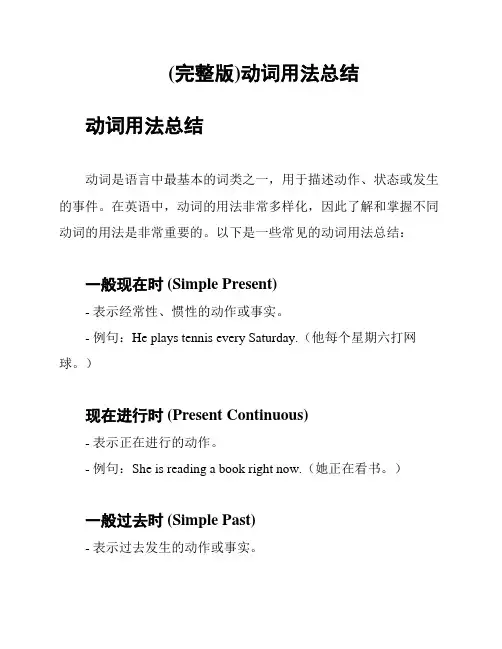
(完整版)动词用法总结动词用法总结动词是语言中最基本的词类之一,用于描述动作、状态或发生的事件。
在英语中,动词的用法非常多样化,因此了解和掌握不同动词的用法是非常重要的。
以下是一些常见的动词用法总结:一般现在时 (Simple Present)- 表示经常性、惯性的动作或事实。
- 例句:He plays tennis every Saturday.(他每个星期六打网球。
)现在进行时 (Present Continuous)- 表示正在进行的动作。
- 例句:She is reading a book right now.(她正在看书。
)一般过去时 (Simple Past)- 表示过去发生的动作或事实。
- 例句:They visited their grandparents last weekend.(他们上个周末去探望了他们的祖父母。
)过去进行时 (Past Continuous)- 表示过去某一时刻正在进行的动作。
- 例句:I was studying when she called.(她打电话时,我正在研究。
)一般将来时 (Simple Future)- 表示将来要发生的动作或状态。
- 例句:We will go on vacation next month.(我们下个月要去度假。
)祈使句 (Imperative)- 表示命令、建议或请求。
- 例句:Please close the door.(请关上门。
)现在完成时 (Present Perfect)- 表示过去发生的动作对现在的影响。
- 例句:I have finished my homework.(我完成了我的家庭作业。
)以上是一些常见的动词用法总结。
掌握这些用法可以帮助你更准确地使用动词,使你的语言表达更加流利和地道。
还有其他更复杂的动词用法,需要根据具体语境进行学习和掌握。
中考英语动词总结Aaccept vt. 接受,认可一个事实(完)ache vi.& n.痛,疼痛achieve vt. 达到,取得act n. 法令,条例v. (戏)表演,扮演(角色),演出(戏);行动,做事add vt. 添加,增加address n. 地址;v.称呼,传达eg: address a speech; address sb.advise vt. 忠告,劝告,建议afford vt. 负担得起(……的费用);抽得出(时间);提供(完型重点)agree v.同意;应允air n. 空气;大气;v.通风(完)allow vt. 允许,准许answer n.回答,答复;回信;答案v. 回答,答复;回信;(作出)答案appear vi.出现arm n.手臂,支架;v.武装,装备eg: armed with tools, 手中拿着工具arrive vi.到达;达到ask v. 问,询问;请求,要求;邀请avoid v.避免,躲开,逃避Bbear n.熊;v.忍受(doing)生育,养育beat (beat, beaten) v. 敲打;跳动;打赢n.(音乐)节拍(完)become (became, become) v. 变得;成为begin(began,begun)v. 开始,着手believe v.相信,认为borrow v. (向别人)借用;借break (broke, broken) v. 打破(断,碎);损坏,撕开(完)breathe vi. 呼吸bridge n. 桥;v.沟通bring (brought, brought) vt. 拿来,带来,取来brush v.刷;擦n. 刷子build (built, built) v. 建筑;造;逐渐好转,尤指身体好转burn (-ed,-ed 或burnt, burnt) v. 燃,烧,着火;使烧焦;使晒黑busy a.忙(碌)的buy(bought,bought) vt.买Ccall n. 喊,叫;电话,通话v. 称呼;呼唤;喊,叫camp n. (夏令)营vi. 野营;宿营cancel vt. 取消care n. 照料,保护;小心v. 介意……,在乎;关心careless a. 粗心的,漫不经心的carry vt. 拿,搬,带,提,抬,背,抱,运等catch(caught,caught)v.接住;捉住;赶上;染上(疾病)cause n. 原因,起因vt. 促使,引起,使发生celebrate v. 庆祝; 纪念chair n. 椅子;v.掌控(完,引申义)change v. 改变,变化;更换;兑换cheat n. & v. 骗取,哄骗;作弊check n.检查;批改vt. 校对,核对;检查;批改choose (chose, chosen) vt. 选择circle n. 圆圈vt. 将……圈起来clap vi.拍手;鼓掌clean vt.弄干净,擦干净a. 清洁的,干净的clear a. 清晰的;明亮的;清楚的;v.清除(away), 天气放晴(up)climb v. 爬,爬行,攀登close2vt.关,关闭cloud n. 云;云状物;阴影; v. 遮蔽coal n. 煤;煤块coat n. 外套;涂层;表皮;皮毛vt.给……穿外套;涂上1coin n. 硬币;v.杜撰,编造(完,阅读)collect vt.收集,搜集come (came, come) vi.来,来到; 逐渐变化,苏醒;eg: when it comes to doing, 一提到……的时候communicate v. 交际;传达(感情,信息等)compare vt. 比较,对照compete vi. 比赛,竞赛complete a.完成的vt. 完成,结束connect vt. 连接,把……联系起来consider vt. 考虑continue vi. 继续control vt.& n. 控制cook n.炊事员,厨师v. 烹调,做饭copy n. 抄本,副本;一本(份,册 (v)抄写;复印;(计算机用语)拷(备份盘)corner n.角;角落;v. 使陷入困境(绝境)correct v.改正;纠正a. 正确的,对的;恰当的cost (cost, cost) v. 值(多少钱);花费cough n.& vi. 咳嗽count vt.数,点数;……要紧,重要;认为(完,阅读重点)cover n. 盖子;罩v. 覆盖,遮盖;掩盖create vt.创造;造成cry n. 叫喊;哭声v. 喊叫;哭cut (cut, cut) v. 切,剪,削,割n . 伤口Ddeal v. 对付,应付,处理decide v. 决定;下决心depend vi.依靠,依赖,指望;取决于describe vt.描写,叙述develop v.(使)发展;(使)发达;(使)发育;开发vt. 冲洗(照片)die v. 死dig (dug, dug) v. 挖(洞、沟等);掘direct a.直接的;直达的;直截了当的vt.指挥;指导;管理;指挥(演奏);导演(电影)discover vt. 发现discuss vt.讨论,议论dismiss vt. 让……离开;遣散;解散;解雇disturb vt. 扰乱;打扰divide vt. 分,划分doubt n. & v.怀疑,疑惑draw (drew, drawn) v.绘画;绘制;拉,拖;提取(金钱);吸引,dream (dreamt, dreamt 或-ed, -ed ) n.& vt.梦,梦想dress n. 女服,连衣裙;(统指)服装;童装v.穿衣;穿着drink(drank,drunk)v.喝,饮drive(drove,driven) v.驾驶,开(车);驱赶drop n. 滴v.掉下,落下;投递;放弃dry v. 使……干;弄干;擦干a. 干的;干燥的Eeasy a.容易的,不费力的;v. 减轻痛苦或紧张;使简单舒适eat (ate, eaten) v.吃encourage vt.鼓励end n. 末尾;终点;结束v. 结束,终止enjoy vt. 欣赏;享受……之乐趣;喜欢enough n. 足够;充足a.足够的;充分的ad.足够地;充分地enter vt.进入examine vt. 检查;诊察excite vt. 使兴奋,使激动excuse n. 借口;辩解vt. 原谅;宽恕exercise n. 锻炼,做操;练习,习题vi. 锻炼expect vt. 预料;盼望;认为explain vt. 解释,说明express vt. 表达;表示;表情n.快车,特快专递eye n.眼睛; v. to see, to watchFface n. 脸vt. 面向;面对fail v. 失败;不及格;衰退2fall (fell, fallen) vi. 落(下),降落;倒fear v.n. 害怕;恐惧;担忧feed (fed, fed) vt.喂(养);饲(养)feel (felt, felt) v.& link感觉,觉得;摸,触fetch vt. (去)取(物)来,(去)带(人)来fight n.打仗(架),争论fight (fought, fought) v.打仗(架),与……打仗(架)fill vt. 填空,装满film n.电影;影片;胶卷vt.拍摄,把……拍成电影find (found, found) vt. 找到,发现,感到finish v. 结束;做完fire n. 火;火炉;火灾vi.开火,开(枪,炮等),射击fish n. 鱼;鱼肉vi. 钓鱼;捕鱼fit a. 健康的, 适合的v. (使)适合,安装fix vt.修理;安装;确定,决定fly (flew, flown) vi.(鸟、飞机)飞;(人乘飞机)飞行;(旗子等)飘动vt. 空运(乘客,货物等);放(风筝、飞机模型等)follow vt.跟随;仿效;跟得上force vt.强迫,迫使forget (forgot, forgotten) v.忘记;忘掉form n. 表格;形式;结构;v. 形成freeze (froze, frozen) vi.结冰Gget (got , got) vt. 成为;得到;具有;到达give (gave, given) vt. 给;递给;付出;给予go (went, gone) vi. 去;走;驶;通到;到达grasp v.抓住;紧握grow (grew, grown) v. 生长;发育;种植;变成guard n. 防护装置,警戒guess vi.猜Hhand n. 手;指针v. 递;给;交付交上;交进hang(hanged,hanged)v.处(人)绞刑;上吊hang (hung, hung) v. 悬挂,吊着;把……吊起happen vi.(偶然)发生;to do, 碰巧hate vt.& n.恨,讨厌have (had, had) vt. 有;吃;喝;进行;经受head n.头;头脑(像);才智;首脑;源头;标题a. 头部的;主要的;首席的v.率领;加标题;用头顶;出发;(船等)驶向heap n.堆v. 堆起来hear (heard, heard) v. 听见;听说,得知heat n. 热vt.把……加热help n. & vt. 帮助,帮忙hide (hid, hidden) v. 把……藏起来,隐藏hit (hit, hit) n.& vt. 打,撞,击中hold (held, held) vt.拿;抱;握住;举行;进行honour (美honor) n. 荣誉,光荣vt. 尊敬,给予荣誉hope n.& v. 希望hurry vi.赶快;急忙hurt (hurt, hurt) vt.伤害,受伤;伤人感情Iimagine vt.想像,设想improve vt.改进,更新include vt.包含,包括increase v. & n.增加,繁殖influence n.& v.影响insist vi.坚持;坚决认为intend vt. 想要,打算interview n.& vt. 采访,会见,面试introduce vt. 介绍invent vt.发明,创造invite vt.邀请,招待iron n. 铁,熨斗vt. 熨烫Jjoin v. 参加,加入;连接;会合3Kkeep (kept, kept) v.保持;保存;继续不断vt.培育,饲养kick v.& n.踢kill v. 杀死,弄死kiss n.& vt.吻,亲吻knock n.& v.敲;打;击know(knew,known) v. 知道,了解;认识;懂得Lland n. 陆地;土地v. 登岸(陆);降落last2v.持续laugh n.& v.笑,大笑;嘲笑lay (laid, laid) vt. 放,搁lead (led, led) v. 领导,带领learn (learnt, learnt;-ed -ed) vt.学,学习,学会leave (left, left) v. 离开;把……留下,剩下lend (lent, lent) vt.借(出),把……借给let (let, let) vt.让lie1n.& vi.谎言; 说谎lie2 (lay, lain) v. 躺;卧;平放;位于lift1v. 举起,抬起;(云、烟等)消散light n. 光,光亮;灯,灯光vt.点(火),点燃a. 明亮的;轻的;浅色的like2vt.喜欢,喜爱line n. 绳索,线,排,行,线路v.画线于,(使)成行listen vi. 听,仔细听litter v. 乱丢杂物live1vi.生活;居住;活着lock n. 锁vt. 锁,锁上long a. 长的,远ad. 长久;v.渴望look n. 看,瞧v. 看,观看v. link 看起来lose (lost, lost) vt. 失去,丢失Mmail n. 邮政,邮递v.(美)邮寄make (made,made)vt.制造,做;使得manage v.管理;设法对付mark n.标记vt. 标明,作记号于market n. 市场,集市marry v. (使)成婚,结婚master vt.精通,掌握match1vt. 使相配,使成对mean(meant,meant)vt. 意思是,意指meet (met, met) vt. 遇见,见到n. 会;集会,满足需求要求mend v. 修理,修补mention n. 提及;记载vt. 提到,说起;提名表扬mind1n. 思想,想法mind2v. 介意,关心miss vt.失去,错过,缺mistake (mistook, mistaken) n. 错误vt.弄错monitor n. (班级内的)班长;监视器;v.监测move v. 移动,搬动,搬家murder vt. 谋杀Nname n. 名字,姓名,名称vt.命名,名叫nod vi. 点头note n. 便条,笔记,注释;钞票,纸币;音符,音调vt. 记下,记录;注意,留意notice n. 布告,通告;注意vt.注意,注意到nurse n. 护士;保育员;v.照顾Oobject n. 物,物体;宾语;v.反对tooffer n.& vt.提供;建议open a. 开着的,开口的vt. 开,打开order2vt. 定购,定货;点菜own a. 自己的v.拥有,所有Ppaint n. 油漆vt.油漆,粉刷,绘画pardon n. 原谅,宽恕,对不起park vt. 停放(汽车)4part n. 部分;成分;角色;部件;零件a. 局部的;部分的v. 分离;分开;分割pass vt. 传,递;经过;通过passage n. (文章等的)一节,一段;通道;pay (paid, paid) v. 付钱,给……报酬n. 工资pick v.拾起,采集;挑选picture v. 勾勒出,想象出plan n.& v. 计划,打算plant vt.种植,播种n. 植物play v. 玩;打(球);游戏;播放n. 玩耍,戏剧please v. 请;使人高兴,使人满意point v. 指,指向n. 点;分数pop = popular a. (口语) (音乐、艺术等)大post n. 邮政,邮寄,邮件v. 投寄;邮寄practise(美practise) v.练习,实践praise n.& vt .赞扬,表扬prepare vt.准备, 预备;调制,配制present n. 礼物,赠品;v. 呈送,展示prevent vt. 防止, 预防print vt.印刷produce vt.生产;制造pronounce vt. 发音protect vt.保护prove vt.证明provide vt.提供pull v. 拉,拖n. 拉力,引力punish v. 惩罚,处罚push n.& v. 推put (put, put) vt. 放,摆Qquestion vt. 询问n. 问题quiet a. 安静的;寂静的;v.使安静Rraise vt. 使升高;饲养reach v. 到达,伸手(脚等)够到read (read, read) v. 读;朗读realise (美realize) vt.认识到,实现reason vi. 评理;劝说n. 理由,原因receive v.收到,得到recite v.背诵record v. 录制,记录refuse vi. 拒绝,不愿regard v. 把……看作regret n.& vt.可惜,遗憾;痛惜;哀悼relax v.(使)放松,轻松remain vt. 余下,留下vi. 保持,仍是remember v. 记得,想起repair n.& vt. 修理;修补repeat vt. 重说,重做reply n.v. 回答,答复report n.& v.报道,报告require vt.需求;要求research n.研究,调查rest n. 休息;剩余的部分,其余的人(物)vi.休息,歇息retell vt.重讲,重复,复述return v. 归还review vt. 重新调查;回顾;复习n. 复查;复习;评论ride (rode, ridden) v. 骑(马、自行车);乘车n. 乘车旅行ring1 (rang, rung) v.(钟、铃等)响;打电话n. 电话,铃声rise (rose, risen) vi. 上升,上涨risk n.v.风险,row v.划船rule n.规则,规定;v. 统治,管理run (ran, run) vi. 跑,奔跑;vt.运行,管理,经营;表思绪混乱;eg: everything is running in my mind.rush vi. 冲,奔跑Ssail n. 航行v.航行,开航sale n.卖,出售satisfy vt. 满足,使满意save vt. 救,挽救,节省say (said, said) vt. 说,讲score n.& v. 得分,分数screen n.幕,荧光屏5search n.& v.搜寻,搜查seat n. 座位,座; v. 使坐下来see (saw, seen) vt. 看见,看到;领会;拜会seem v. 似乎,好像sell (sold, sold) v. 卖,售send (sent, sent) v.打发,派遣;送,邮寄sense n. 感觉,意识;v. 感知sentence n. 句子;vt.宣判separate v.使分开,使分离a. 单独的,分开的serve vt.招待(顾客等),服务;上菜,起到…..作用set n. 装备,设备vt.设置(布景,背景)set (set, set) vt. 释放,安置shake (shook, shaken) v.(使)动摇,震动shame n. 遗憾的事;羞愧v.使羞愧shape n.形状,外形v. 使成型,制造,塑造share vt. 分享,共同使用shine (shone, shone 或-d, -d) v. 发光;照耀;杰出;擦亮ship n. 船,轮船vi. 用船装运shop vi. 买东西n.商店,车间shoulder n. 肩膀;(道路的)路肩;vt.承担shout n.& v.喊,高声呼喊show (showed, shown 或showed) v.给……看,出示,显示shower n. 阵雨;v.n淋浴shut (shut, shut) v. n. 关上,封闭;禁闭;shy a. 害羞的;v.远离sing (sang, sung) v.唱,唱歌sit (sat, sat) vi.坐skate vi.溜冰,滑冰sleep (slept, slept) vi.睡觉smell (smelt, smelt 或-ed, -ed) v.嗅,闻到;发气味smile n.& v.微笑smoke n. 烟v. 冒烟;吸烟snake n. 蛇v.蛇般爬行;蜿蜒行进snow n.雪vi.下雪sort vt.把……分类,拣选n. 种类,类别sound vi. 听起来;发出声音n.声音spare a. 空闲的,多余的,剩余的;vt.节省,留给speak (spoke, spoken) v. 说,讲;谈话;发言speed n. 速度v.(使)加速spell vt.拼写spend (spent, spent) v.度过;花费(钱、时间等)spread v.延伸;展开stand (stood, stood) v. 站;立;起立;start v.开始,着手;出发state v.陈述,说明stay n.& vi.停留,逗留,呆steal (stole, stolen) vt. 偷, 窃取step n. 脚步,台阶,梯级vi. 走;跨步stick (stuck, stuck) vi. 粘住,钉住;坚持n.木棒(棍),枝条stop n. 停;(停车)站v.停,停止,阻止store n.商店vt.储藏,存储storm n. 风暴,暴(风)雨;vt….骤然而至stream n. 小河;溪流;v.泪奔study v. 学习;研究n. 书房succeed vi.成功suggest vt. 建议,提议supply vt.& n. 供给,供应suppose vt. 猜想,假定,料想surprise vt. 使惊奇,使诧异n. 惊奇,诧异sweep(swept,swept)v. 扫除,扫swim (swam, swum) vi.游泳,游swing vt.挥舞,摆动n. 秋千Ttail n. (动物的)尾巴;vt. 切断,剪切take (took, taken) vt. 拿;拿走;做;服用;乘坐;花费talk n.& v. 谈话,讲话,演讲;交谈teach(taught,taught) v.教书,教telephone v. 打电话n. 电话tell (told, told) vt.告诉;讲述;吩咐;区分,判断6test vt.& n. 测试, 考查,试验thank vt.感谢,致谢,道谢n. (复)感谢,谢意think(thought, thought) v. 想;认为;考虑throw (threw,thrown)v. 投,掷,扔tidy a. 整洁的,干净的vt.弄整洁,弄干净tie vt. (用绳,线)系,拴,扎n. 领带,绳子,结;关系time n.时间;时期;钟点;次,回vt. 测定……的时间,记录……的时间touch vt.触摸,接触tower n.塔;vt. 耸立trade n. 贸易vt.用……进行交换train n.火车v. 培训,训练translate vt. 翻译travel n.& vi.旅行treasure n. 金银财宝;财富;vt.珍惜,珍视trip n. 旅行,旅程;v.over 绊倒trouble vt.使苦恼,使忧虑,使麻烦n.问题,疾病,烦恼,麻烦trust vt.相信,信任,信赖try v.试,试图,努力turn v. 旋转,翻转,转变,转弯n. 轮流,(轮流的)顺序Uunderstand (understood, understood) v. 懂得;明白;理解use n.& vt.利用,使用,应用Vvalue n. 价值,益处;v. 重视visit n.& vt.参观,访问,拜访voice n.说话声; 语态;v. 畅所欲言Wwait vi.等,等候wake (woke, woken) v. 醒,醒来,叫醒walk n.& v.步行;散步want vt. 想,想要;需要,必要warn vt.警告,预先通知wash n. 洗(涤);冲洗;洗剂;泼溅;洗的衣服v. 洗(涤);冲洗;流过;弄湿waste n.& vt. 浪费watch vt.观看,注视;当心,注意n. 手表,表water n.水v.浇水wear (wore, worn) v. 穿,戴weigh vt. 称……的重量,重(若干)welcome int.n. & v.欢迎a. 受欢迎的win (won, won) n. 获胜,赢得wind n. 风wind(wound,wound) vt.缠绕,连带;蜿蜒,弯曲wish n.愿望,祝愿vt.希望,想要,祝愿wonder v.对……疑惑,感到惊奇,想知道n. 惊讶,惊叹;奇迹work n. 工作,劳动,事情vi. 工作;(机器、器官等)运转,活动worry n.& v. 烦恼,担忧,发怒;困扰wound vt. 伤,伤害n.创伤,伤口write (wrote, writ ten) v.写, 书写;写作,著述7。
2010 年中考英语语法基础: 动词的定义2010 年中考英语语法基础: 动词的定义动词是表示动作或状态的词。
例如: wor ,工作 ,study ,学习, eat 吃。
动词的分类:动词有两种分类方法。
1)限制动词和非限制动词。
限制动词在句中作谓语,有人称和数的变化。
非限制动词有动词不定式,动名词和分词三种。
在句中不可以独自作谓语,没有人称和数的变化。
2)实义动词,连系动词,神态动词和助动词。
实义动词有完好的词义,并能独自作谓语,实义动词又可分为及物动词和不及物动词。
比如:study学习 ,reach抵达,see看见,rise升起。
连系动词在句中作谓语动词,后边跟表语。
连系动词有be,see,loo,becoe,get,grow,feel,appear,reain,turn。
神态动词表示能力,义务,必需,猜想等说话人的语气或神态。
神态动词只好和动词原形一同构成谓语动词。
神态动词有can,will,have,be,should,do,would,等。
助动词只好和主要动词一同构成各样时态,语态和语气等动词形式。
do,shall,will,have,has.动词的基本形式。
英语动词有四种基本形式:动词原形,过去式,过去分词和此刻分词。
这四种动词形式和助动词一同构成动词的时态,语态和语气。
动词的原形。
就是字典中所给的形式。
比如:be,have,buy,sit.动词过去式和过去分词的构成有规则的和不规则的两种形式。
规则动词的过去式和过去分词,由在原形动词的后边加词尾 -ed 构成。
wor-wored-wored不规则动词的过去式和过去分词的形式是不规则的,须要一一记忆。
go-went-gone do-did-done动词的此刻分词由动词原形加-ing构成。
构成方法以下:1)一般状况在动词原形后加 -ing 。
go---goingstand---standing2)以不发音的 e 结尾的动词,去掉 e,再加 -ing.动词是闭音节的单音节词,或是以重读闭音节结尾的多音节词,而末端只有一辅音字母时,这个辅音字母须双写,而后再加 ing 。
动词分类及用法动词是语言中最基本的词类之一,用于表示动作、状态、或存在的方式。
根据其词义及用法的不同,动词可以分为及物动词、不及物动词、及物不定式、不及物不定式以及连系动词。
本文将详细介绍这些动词及其用法。
I. 及物动词(Transitive Verbs)及物动词是指需要一个宾语或宾语补足语来完整表达动作意义的动词。
以下是一些常见的及物动词及其用法:1. 吃(eat):他吃了一个苹果。
2. 看(see):我看到了他在公园里散步。
3. 喜欢(like):他喜欢学习英语。
4. 打电话(call):她打电话给她的朋友。
II. 不及物动词(Intransitive Verbs)不及物动词是指不需要宾语或宾语补足语即可表达完整意义的动词。
以下是一些常见的不及物动词及其用法:1. 睡觉(sleep):他昨晚睡得很晚。
2. 跑(run):她每天早上都去跑步。
3. 想(think):我想这个问题很久了。
4. 哭(cry):他看到悲伤的电影时哭了。
III. 及物不定式(Transitive Infinitives)及物不定式是作为及物动词的宾语的不定式形式。
以下是一些常见的及物动词及其后接的及物不定式:1. 希望(hope):我希望能够旅行世界各地。
2. 想要(want):他想要学习新的技能。
3. 计划(plan):我们计划明天去购物。
4. 学会(learn):她学会了弹钢琴。
IV. 不及物不定式(Intransitive Infinitives)不及物不定式是不需要宾语的不定式形式。
以下是一些常见的不及物动词及其后接的不及物不定式:1. 学习(learn):他每天都努力学习。
2. 出发(depart):明天我们将出发去旅行。
3. 睡觉(sleep):他很晚才睡觉。
4. 练习(practice):我需要练习我的英语口语。
V. 连系动词(Linking Verbs)连系动词(也称为系动词)用于连接主语和表语,表达主语的状态、特征或属性。
1. allow sb to do sth 允许某人去做某事(后接动词不定式)My father allowed me to go out for a walk after finishing my homework.2. asked sb (not) to do sth 叫某人做事某事(叫某人不要去做某事)My father asked me to study hard.He asked me not to swim alone.be asked to do sth 被叫去做某事/被邀请去做某事I was asked to have a dinner with them yesterday.3. be afraid to do sth 害怕做某事She is afraid to ask me questions.4. be afaid of doing sth 害怕做某事I am afraid of going out at night.5. be afaid of sth 害怕某物He is afraid of snakes.6. be amazed to do sth 对做某事感到惊讶He was amazed to meet the girl there.be amazed at sth 对某事感到惊讶they were amazed at the news.7. be busy doing/with sth 忙于做某事(常考)e.g: I was busy wash ing my car at that time.那时候我正忙于清洗我的车子。
I am busy with my work.8. be coming/going/leaving/fiying/moving/dying (某些位移动词用进行时态时表将来)the bus is coming/the dog is dying.9. be excited to do sth 对做... 感到兴奋Jacky was excited to travel there by plane.be excited at sthLily was excited at his words.be excited about doing sthhe was excited about passing the exam without going overing books.10. be frightened to do sth 害怕去做某事Sam is frightened to ride a horse.11. be glad/happy to do sth 高兴去做某事she is happy to clean the blackboard with me.be pleased to do sth高兴做某事she was pleased to help the old man yesterday.be pleased with sth 对某事感到高兴/满意the teacher was pleased with my answer.12. be interested in sth/doing sth 对某事感兴趣/对做某事感兴趣she is interested in swimming in the river.My btother is in terested in Chin ese.13. be/get ready for/to do sthBe ready for sth 为某事做好了准备We are ready for the exam.Be ready to do sth 为做某事做好了准备We are ready to have a birthday party for her. get ready for sth 为某事在做准备We are gett ing ready for the exam. get ready for sth 为做某事而做准备 13. be sorryto do sth 对做某事感到抱歉 14. be surprised to do sthbe surprised at sth 15. be worth doing sth 16. begin to do sth 对做某事感到惊奇 对某事感到惊奇值得做某事(worth 后接动词-ing 形式,常考)-开始去做某事 begi n/start to do/do ing sth J17. can/be able to afford (to buy ) sth 有能力购买(供)18. can/may/must do sth could/would/should/might do sth19. can 'wait to do sth 迫不急待地去做某事20. decide to do sth 决定去做某事make up on6s mi nd to do sth 下决心去做某事(常考)make a decisi on to do sth 对做某事作出决定21. deserve to do sth 值得 /应该做 ..22. encourage sb to do sth 鼓励某人去做某事23. enjoy doing sth 乐意去做某事24. expect (sb ) to do sth 期望去做某事25. fail to do sth 做某事失败succeed doing sth 成功做了某事28. get sb to do sthmake sb do sth let sb do sth29. get/have a chanee to do sth 得到一个做某事的机会30. give/pass/show/lend/sell sb sth/sth to sbbuy/get/bri ng sb sth/sth for sb31. go on to do sth 继续做事(常考)go on doing sth 继续做事(常考)32. hate to do/doing sth 讨厌/不喜欢做某事33. have fun doing sth26. finish doing sth 做完某事(后接动词-ing 形式)(常考) 27. follow sb to do sth 跟随某人去做某事让某人做某事(后接动词原形)34. have problems doing sth 做某事遇到困难35. have sb do sth have sth donehave sth to do36. hear sb do sth hear sb doing sth 37. help to do sth help sb (to ) do sth38. hope/wish to do sthwish sb to do sth39. I t seems thatseem to do sthseem +adj40. It ' s + adj+(for sb ) to do sth .It s +adj +(of sb ) to do sthe.g: It's glad for him to hear the n ews.41. It takes sb some time/money to do sth .花费某人多长时间做某事(常考)42. pay …for … cost spend …on ….. it take …to do sth43. It s best for sb to do sth.对某人来说做某事是最好的had better do sth 最好做某事(注意had 没有时态和人称的变化,better 后接动词原形) 44. It s time for sb to do sth 是某人做某事的时候了45. keep (on )doing sth 坚持做某事(常考)keep sb doi ng sth 让某人做某事(常考)keep sb from doi ng sth 阻止某人做某事(常考)keep sb/sth +adjkeep the book for 2 days 借这本书两天(不要用 borrow 或 lend )46. learn to do sth 学做某事lear n sth from sb 向某人学习47. like to do/doing sth 喜欢做某事like sb to do sth 喜欢某人做某事48. need to do sthn eed doing sth/to be done需要做某事n eed sth n eedn'tdo sth 49. prefer to do sth rather than do sth 宁愿 ... 而不愿 ... (常考)prefer doing sth to doing sth 喜欢做 .. 胜过做 ...e.g: I prefer read ing books to going shopp ing.比起购物来,我更爱读书。
中考英语动词用法大全动词原形及不定式的用法动词原形的用法1.除单三人称的一般现在时,其它人称作主语,动词用原形。
2.将来时态shall, will, should, would之后用动词原形。
3.祈使句句子开头用动词原形。
4.助动词do, does, did之后用动词原形。
5.情态动词can、could、may, might, have/has to, must, need, dare ,ought to之后用动词原形。
6.使役动词let、 make、have 之后用动词原形。
7.感官动词see、watch、notice、hear、 feel、find之后用动词原形(说明动作已经结束)。
8.had better 之后用动词原形。
9.why / why not 之后用动词原形。
10.would rather dosth . than do sth .11.prefer to dosth. rather than do sth./ prefer doing sth. to doing sth.动名词的用法1.介词之后动词要用动名词形式(动词+ing)2.部分动词之后的动词只能用动名词形式:enjoy, finish, practice, mind, spend,dislike, find , keep3.部分短语后省略了介词in: have fun/ problems/ difficulties/trouble /a good time doing be busy doing,4.be worth doing, can’t help doing , feel like doing , do some doing sth.5.下面这些动词既可跟动名词又可跟不定式:like / love / hatedoing (doing表示习惯)(to do表示具体的动作)stop doing(表示停止)(doing表示开始做不定式的动作);remember , forget (不定式表示未做;动名词表示已做);try (doing表示试着做;to do表示努力做);go on (doing继续做相同的事 to do继续做不同的事)begin , start (to do与doing区别不大) ;need (人作主语用to do ;物作主语用doing表示被动);mean(人作主语用to do表示“打算做”;事 / 物作主语用doing表示“意味着”);这些动词既可跟动词原形,又可跟ing形式:see,watch,hear.notice (用原形是指动作结束,ing表示动作正在进行)动词不定式的用法1.ask/tell/want/order/teach/wish/wouldlike/invite/encourage sb. to do sth.2.ask/tell/want/order/teach/wish/wouldlike/invite/encourage sb. not to do sth.3.Help...(to) dosth.4.主系表 + 不定式(to do)5.主系表 +for sb + 不定式(to do)6.部分动词既可跟动名词又可跟不定式:(同动名词 6)7.疑问词+不定式(to do)可以把复合句变为简单句,(to = 主语+will/would/can)英语动词双写规则及常见动词英语动词双写规则必须同时满足以下 4 个条件1) 该动词的发音以重读闭音节结尾;重读闭音节就是指在一个音节中,元音字母不是发它本身的字母音,以辅音字母结尾,而且是重读音节的音节。
【导语】中考快到了,中考频道为⼤家整理到中考英语动词分类及动词短语,希望对⼤家有帮助,快来看看吧。
中考英语复习之动词分类及动词短语⼀、动词的分类(实义动词、系动词、助动词、情态动词)1.实义动词(包括及物动词和不及物动词)2.系动词(⼀是⼀感⼀保持,起来四个好像变了仨)be,feel,stay,keep,look,smell,taste,sound,seem,turn,become,get3.助动词(进⾏时be+V-ing,被动语态be+V-ed,完成时have/has/had+V-ed,将来时will/would/shall+V原,⼀般现在时do/does,⼀般过去时did)4.情态动词(can,could,may,might,must,need,shall,should,will,would)★(1).不及物动词没有被动语态;(2).⾮延续性动词不能与表⽰⼀段时间的词语连⽤(否定句除外)⼆、易混词辨析ed to do sth表⽰过去常常做某事 be used to doing sth表⽰习惯于做某事2.dress sb/oneself给某⼈穿⾐服, put on穿上,戴上,表动作;wear穿着,戴着,表状态,与be in同义。
3.see看见,表结果;look,看,表动作,不及物动词,后⾯须加介词at才能跟宾语;watch看(电视、⽐赛) read看(书、报),表⽰阅读4.bring(带来,拿来),表⽰从远处拿到说话者的地⽅take(拿⾛,带⾛),表⽰从说话者的地⽅拿到远处fetch(去拿来),表⽰⼀个来回、往返的过程carry,⽤⼒搬运,没⽤⽅向性5.die,死,不及物动词,⾮延续性动词(die of死于)dead死的,形容词,表状态;death,死,名词;dying垂死的,要死的,形容词His grandfather died two years ago.= His grandfather has been dead for wo years.= His grandfather has been dead since wo years ago.6.sb spend some time on sth某⼈花费多少时间在某事上sb spend some time (in) doing sth某⼈花费多少时间做某事it takes sb some time to do sth做某事花费了某⼈多少时间sb pay some money for sth某⼈为某物⽀付了多少钱sth cost sb some money某物花费某⼈多少钱7.look for强调寻找的过程,find强调寻找的结果8.listen to强调听的动作,hear强调听的结果9.hang的过去式(过去分词)hung悬挂,hanged绞死,吊死10.lose输(lose to sb输给某⼈) fail指失败或未能做成某事(fail/pass the exam)beat打败,后接sb或某⽀队伍 win赢得(荣誉、地位、⽐赛)11.lose丢失,失去;forget忘记(forget to do sth 忘记去做某事,forget doing sth 忘记做过某事)leave sth +地点(吧某物落在某地)12.think of想到,认为;think about考虑;think over仔细考虑,反复思考13.may be(可能是)为情态动词加原形表⽰推测,在句中做谓语;maybe (⼤概,也许)为副词,相当于perhaps,⽤于句⾸My father may be at home now.= Maybe my father is at home now.三、常见的动词短语1.look for寻找, look after照顾, look forward to doing sth渴望做某事, look at看着,look up抬头看,查找,look like看起来像,look through浏览,look out当⼼2.put off推迟,put on穿上,上演,put away把…收起来,put up举起,建造,张贴,put out扑灭,put down写下,放下3. turn down把⾳量开⼩⼀点;拒绝;turn up把⾳量开⼤⼀点;出现,turn over翻开;翻转,,turn on 打开(电灯等) turn off 关(电灯等)4.be friendly/kind to对…友好,be different from与…不同,be afraid of害怕,be popular with受…欢迎,be interested in对…感兴趣,be surprised at对…惊讶,be proud of(take pride in)对…感到⾃豪,be strict with sb对某⼈严格,be strict in sth 对某事严格, be good at擅长,be sure of/about对…有把握,be made up of由…构成,be angry with sb对某⼈⽣⽓;be busy with sth忙于;be full of/filled with装满了,be late for…迟到,be covered with覆盖着be famous/known for因…;be famous/known as作为…有名5.get on/along (well) with与某⼈相处(融洽),在…进展(顺利),get up起床,get on上车(船、飞机),get off下车get home到家,get out (of) (从…)出去,get to到达get together聚会,get over克服,get used to习惯于6.take off(飞机)起飞,脱掉(⾐服),take away拿⾛;take out取出,take up占据时间、空间,开始从事,拿起,take photos 照相,take one's place= take the place of sb坐某⼈的座位;代替某⼈的职务 take a seat就坐take a shower淋浴,洗澡take care of照顾 take care⼩⼼,当⼼take one’s temperature量体温 take part in参与,参加 take it easy别着急,慢慢来7.agree with sb同意某⼈agree to do sth同意做某事8.pick up拾起,捡起,拿起,收听,⽤车接送客⼈、货物,收拾、整理;pick out挑选。
动词汇总1.accept vt.&vi. 接受,同意receive 收到(但不一定接受)2.ache vi. 痛n. 疼痛aches and pains 各种各样的病痛3.achieve vt.完成,实现,达到n. achievementachieve one’s goals 达到目的4.act vi.行动vt.扮演其他意思:n. 行为act as (临时)担任,充当;扮演……的角色;起……的作用catch sb. in the (very) act (of doing sth.)(=catch sb. red handed)当场捉到某人donkey act [美俚]蠢笨的行动Dutch act [美俚]自杀5.add vt.&vi. 添加,加add in 算入; 包括add to增加, 加到add up 加起来, 总计; 和预期产总数相等;add up to总计共达; (总起来看)等于说; 意味着6.address vt. 写地址其他意思:n. 住址,演说accommodation address 临时通讯处be addressed to ab. 寄给……7.advise vt. 劝告,建议,通知advice un.建议a piece of adviceadvise sb. to do sth . 建议……做……8.afford vt. 负担得起,买得起,提供afford time/money (动词前往往有情态动词can或can’t)9. agree vt.&vi. 同意,赞成agree like cats and dogs 水火不相容agree to do 同意做……。
agree with同意...的意见; 与...一致; 对...适合10.aim vi. 瞄准,针对其他意思:n. 目标,目的11.allow vt. 准许allowance 津贴allow doing 允许做……allow sb. to do 允许某人做……be allowed to do 被允许做……12.answer vt. 回答,答复其他意思:n. 答案,回答soft answer 温和[委婉]的回答answer the door /telephonethe answer to the questionanswer the question = reply to the question13.arrive vi. 到达n arrivalarrive at/in 到达(目的地); 达到, 得出(结论等)(没有明确地点arrive)=get to = reach (够到……,达到某种水平或数字)14.ask vt. 询问,请求,要求ask sb. for sth 要; 请求, 征求要(价) 找ask sb. (not) to do sth.15.avoid vt.避免,撤销avoid doing 避免做某事16.awake vt.唤醒vi.醒其他意思:adj. 醒着的be wide/broad awake 完全醒着警觉; 不易上当受骟完全知道, 充分觉察到awake to the fact that 认识到...的事实be/keep awake 醒着17.wake v. 醒wake up 醒来e.g. James usually wakes up early.wake sb up 叫醒……e.g. My mother wakes me up at six o’clock.辨析:①wake多用于不及物动词②waken只用于及物动词③awake指唤醒(意志……)也可为adj指清醒的18.be (is am are was were being been)v. 是存在aux.v (无词义) Let it be. 随它去be+及物动词过去分词构成被动语态be+现在分词构成进行时be+有to的不定式表示约定计划职责义务愿望可能命运等The book is to come out.You are not to do that. 你不该那样做.be for 到…去赞成I’m for Shanghai.We are for just war.be from 从…来生在(某处)be gone. 走开,不见了。
have been to+次数去过某地几次have been in +地点+时间段在某地带了多长时间19.beat v.打败敲打(心脏等)跳动打动(心)win (won won) vt获胜,赢得(比赛荣誉等等)win在游戏、比赛、竞赛、选举等中获胜,常跟game,race,competition,war等表示物的单词beat 在运动比赛中获胜,打败了其他人或其他队,常跟sb,class,some team等表示人的单词(beat=defeat)n.(连续的)敲打(声) (时钟等的)滴答声(心脏脉搏等的)跳动悸动节拍off/on the beat (不)和节拍20.bear v. 容忍负担,孕育n. 熊bear and forbear 一忍再忍be born in /at 出生born adj 天生的He was a born poet . 他天生就是个诗人。
21.become v. 变得成为表变化的系动词become be get go22.begin v. 开始在完成时态中须变成be onbegin with 以…开始begin to do/doing 开始做…to begin with 首先第一To begin with, he is too young.Well begun is half done . 良好的开端是成功的一半。
23.behave v. 行为举止behavior n. 行为举止behave oneself=behave well24.believe v. 相信认为否定前置believable adj. 可信的believe sb.=believe what sb.saidbelieve in sb.=trust sbbelieve it or not 信不信由你25.belong v. 属于belong to 属于26.blow v. 吹blow one’s nose 擤鼻子27.boat v. 划船go boating/swimming/shopping/sightseeing28.book v. 预定n. 书bookworm 书虫book a ticket to the concert29. borrow v. 借borrow sth. from sb. 向某人借某物lend sb. sth = lend sth to sb 把某物借给某人keep sth for some time 借多长时间30.break v. 打破违反break the rules= be against the rulesbreak down (机器等)坏了车抛锚break into 破门而入break out (火灾,水灾等)发生n. 休息have a break31.breathe v. 呼吸breathe in/out 吸入/呼出breath n. 呼吸out of breath 气喘吁吁hold one’s breath 屏住呼吸take a deep breath 深呼吸32.build v. 建造build up 确立树立;促进(身体康复)33.burn v. 燃烧burn daylight 白昼点灯徒劳无益burn to the ground 烧成灰烬burn up 烧完燃尽money burns a hole in o ne’s pocket 钱烧包burnt adj. 烧糊的34.buy v. 买buy sth. for sb.=buy sb sthhave sth for some time 买了多长时间35.call v.叫,叫做,打电话n.电话叫喊声make a phone call to sb 给……打电话call for要求call off 取消call in 召集call at 访问(某处) (车船等)停靠(某地).call on (1).访问(sb.),(2).号召;要求call back (1).回电话;(2).召回,叫回来call up (1).打电话(2).使人想起36. camp n.露营地, 阵营v.露营go camping37.can n.罐头,听头,容器v.能够(1)=be able to do(2)must be 表示肯定的猜测,can’t be 表示否定猜测38. cancel v.取消, 删去cancel sth out 抵消cancellation n.取消39. carry v.携带, 搬运carry on sth 从事carry on (with sth/doing sth)继续carry out 开展, 实现, 完成, 进行到底贯彻, 执行, 落实40. catchv.捉[逮, 截]住, 捕获,赶上(车、船等)领悟, 听清, 了解, 理会catch up with追上, 赶上,Speak slowly please,I can’t catch you .41.cause n.原因, 理由, 缘故; 目标, 事业v. 引起,使发生cause 指―产生结果的原因‖ 或―使某事发生的原因‖, 如:Carelessness is the cause of his failure. 粗心是他失败的原因。
reason 指―根据事实、情况或产生的结果,推导出结论的理由或道理‖, 如: The reason for the flood was all that heavy rain. 那场大雨是发生洪水的原因。
42. celebrate v. 举行(仪式); 庆祝(胜利等); 祝贺,赞美, 颂扬,公布, 发表celebration n. 庆祝,典礼43. centre v.集中n.中心centre around/on 集中于in the centre of 在……的中心44. change n.改变, 变化, 转变, 找回的零钱v.改变, 变革, 改造, 兑换change one's mind 改变某人主意change into 变成.翻译成Here is your change. 这是找回的零钱。
Great changes have taken place in my hometown since I left .45.chant n.圣歌v.赞美,喃喃地唱46.cheat n.欺骗, 骗子v.欺骗, 骗取47.check n.支票v.检查, 制止, 核对, 寄存, 托运check in 签到; 报到; 办理住宿手续;48.cheer n.愉快v. (使)快活, (对)欢呼cheerful adj 高兴的,欢呼的cheer up 欢呼,振作cheer sb. up 使……振作起来cheers ! 干杯!Here’s to …… 为了……49.choose v.选择, 选定choice n. 选择choose to do 选择做……have no choicemake a /one’s choice50.circle n.圆周, 圆形物, 派系, 循环v.围, 环绕in circles 打转转; 毫无进展51.clap n.拍手声, 霹雳声v.鼓掌, 轻拍52.clean adj.清洁的, 干净的, 清白的v.打扫, 使干净, 清扫clean/clear/tidy up 收拾干净keep the room tidy and clean53.climb v.攀登, 爬n.攀登, 爬54.clone n.无性繁殖, 克隆v.无性繁殖, 复制55.close v.关, 关闭, 结束, 停止, n.结束adj.近的,亲密的adv.接近, 紧密地close down (工厂等的)关闭,停歇;(电台的)停止播音be close to 和……亲近,离……近close friends 亲密朋友keep your eyes closed and keep your mouth open56.cook vt&vi 1.烹调,煮cook the meal = do some cookingn 厨师cooker n 厨具cookery n 烹饪术57. copy v. 抄,复制;模仿,效仿(某人或某事);抄袭a copycat 盲目地模仿者n. 抄本,复制品;(杂志、书籍、报纸等)一本,一册Eg Did you get your copy of ―China Daily‖ today?58.cost值;花费(无被动式)sth cost sb sm(to do)sb spend money/time (in) doing sth./on +n.sb pay money for sthIt take sb time to do sthHow much does it cost?=What is the price of it?n. 价格;成本at the cost of 以……为代价at all costs 不惜任何代价eg. We must avoid war,at all cost. 我们必须不惜任何代价避免战争。